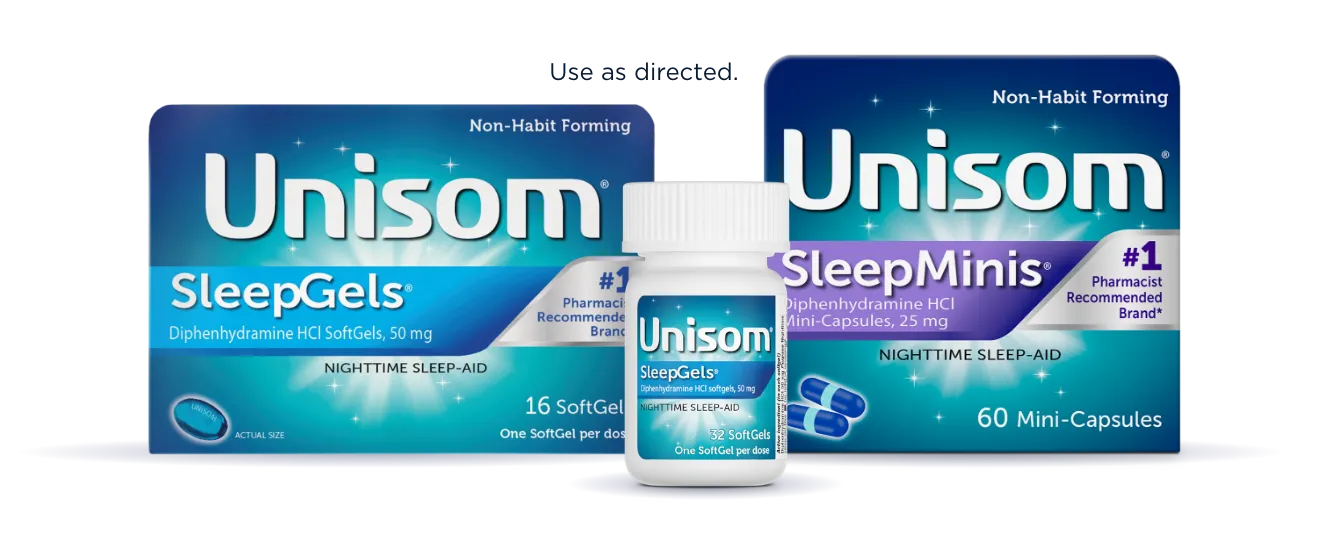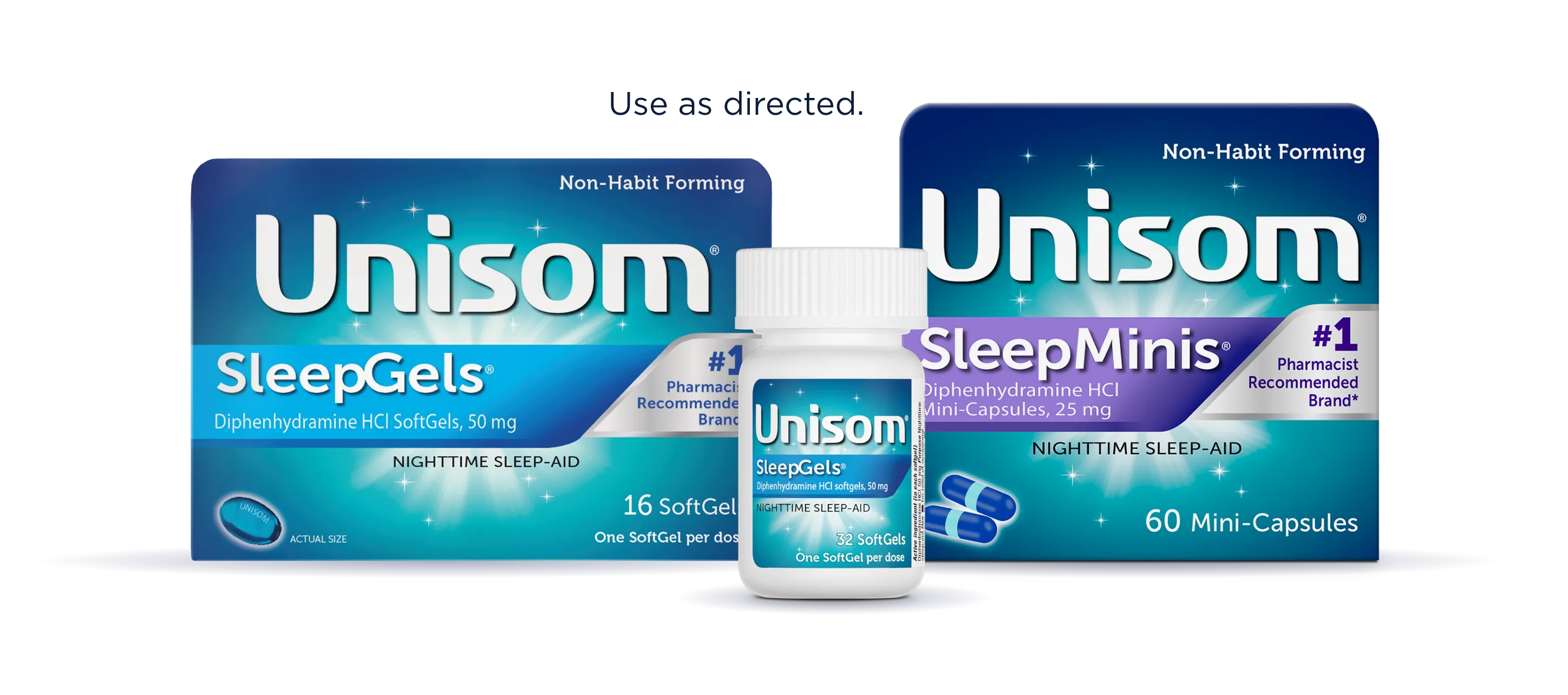Melatonin, also known as the “sleep hormone” or “hormone of darkness,” is the most commonly used sleep-aid in the United States. But how can you be sure if this nighttime supplement is right for you? Join us as we uncover all the important facts about melatonin below—including the benefits of melatonin, how it works, the important role it plays in your sleep cycle, and how our sleep-supporting supplement Unisom Simple Slumbers® can help you catch some better Zzzs.
What Is Melatonin?
Natural melatonin is a hormone produced by your brain’s pineal gland. Released in response to darkness, your melatonin levels naturally increase in the evening after the sun goes down. This, in turn, helps regulate your body’s 24-hour sleep-wake cycle (also known as your “internal clock” or circadian rhythm) to help signal when it’s time to wind down for bed—therefore helping to promote a good night’s rest.
What does melatonin do for sleep?
Humans are biologically programmed to be awake during the daytime and asleep at night, and melatonin plays an essential role in keeping your body’s internal clock running on time. Although melatonin is vital in maintaining many other aspects of your health, such as immunity and blood pressure, it’s most well-known for helping to support a restful sleep and promote a healthy sleep-wake cycle.
What happens if you don’t produce enough melatonin?
When it gets dark, increased melatonin levels help you feel sleepy and ready to drift off to slumberland. However, there are many factors that can get in the way of your body’s ability to produce the ideal amounts of melatonin at the right times—from travel to stress, late-night work shifts, and even the natural aging process.
Since melatonin production is influenced by light, research shows that increased light exposure close to bedtime—especially blue light from electronic devices—can decrease melatonin levels (and therefore throw your sleep cycle out of whack).1 When this happens, you may experience greater difficulty falling asleep or increased sensitivity to sleep disruptors throughout the night.
How Do Melatonin Supplements Work?
Sleep supplements containing melatonin work by increasing your body’s levels of this sleep-supporting hormone. They’re usually sold over-the-counter in the form of melatonin tablets, capsules, or chewable gummies. Although nature-made melatonin does exist, which is made from animals or microorganisms, it’s far more common for melatonin supplements today to be produced in a lab.
Will taking melatonin help me fall asleep faster?
When used correctly—per the instructions on the product label or as directed by a healthcare professional—sleep-aids formulated with melatonin may help regulate your sleep-wake cycle so that you can drift off to sleep faster.
One systematic review of numerous melatonin studies found that, when taken prior to dozing off, melatonin helped participants fall asleep faster and allowed them to enjoy a better quality sleep overall.2 And if you’re wondering how much faster, you’ll be excited to learn that—according to a review of 15 different studies of 284 people—using melatonin for sleep support resulted in faster sleep latency (the time it takes you to doze off at night) and more total sleep time on average.3
Are melatonin supplements different from over-the-counter sleep-aids?
When trying to decide whether or not melatonin supplements are right for you, it’s important to remember that sleep supplements (like melatonin), over-the-counter medicinal sleep-aids, and prescription sleep medication are all different categories of sleep-aids. Unlike over-the-counter sleep-aids—which contain histamine blockers like diphenhydramine HCl and produce a drowsy effect—melatonin is not a sedative. Rather, it primarily works with your body to balance your internal clock naturally.
Who Should Try Melatonin Supplements?
Research has found melatonin supplements to be particularly helpful for people facing disruptions to their circadian rhythm—especially travelers experiencing jet lag, those with delayed sleep-wake phase disorder (DSWPD), and potentially night-shift workers (although more research is needed in this area).4
Similar to over-the-counter medicinal sleep-aids, melatonin products are meant to help relieve occasional sleep troubles in otherwise healthy sleepers. Therefore, if you find that melatonin supplements aren’t working for you or your sleep concerns persist beyond two weeks’ time, it’s best to seek the help of a healthcare professional.
When To Take Melatonin Supplements
Harnessing the snooze-inducing benefits of melatonin all comes down to correct usage and timing. If you’re looking to use melatonin supplements to drift off to sleep faster, try taking them approximately 30-60 minutes before your usual bedtime to complement your body’s naturally-increasing melatonin levels. The goal is to time your melatonin dose strategically, so that it works in tandem with your body’s natural rhythm, rather than accidentally throwing off your internal clock further.
If you’re a frequent traveler and want to use melatonin to help stay ahead of jet lag, try starting your melatonin supplement a couple of days before your trip, taking it about two hours before what will be your bedtime in the time zone of your final destination.
How Much Melatonin Should I Take?
According to research, the ideal melatonin dosage is between 3 and 5 mg taken approximately 30-60 minutes before heading off to sleep.5 However, since melatonin supplements are typically drug-free, they’re not fully evaluated by the Food & Drug Administration (FDA), so the recommended dosage can vary from product to product.6 Therefore, it’s crucial that you always follow the instructions on each specific product’s label when taking melatonin for sleep support.
If you want to get the most out of your melatonin sleep supplements, you can also help promote their sleep cycle benefits by limiting activities that might suppress your natural melatonin levels at night—such as avoiding long naps (especially in the evening), unplugging from artificial light close to bedtime, and generally practicing good sleep hygiene.
Is Melatonin Safe?
As a dietary sleep supplement, melatonin for adults is non-habit-forming and generally considered to be safe for short-term use, with no serious side effects when used as directed. According to one 2015 review, some of the mild melatonin side effects reported when taken in higher doses included drowsiness, dizziness, headache, and nausea.4
Who should avoid melatonin supplements?
Since melatonin can leave you feeling sleepy, it’s best to avoid driving or operating heavy machinery while taking this sleep supplement. Melatonin also may not be suitable for pregnant or breastfeeding women, or for those with certain medical conditions. When in doubt, speak to your healthcare provider for guidance on whether melatonin supplements are the right fit for you.
Rest Assured
When sleep troubles arise, Unisom® is here for you with a range of options. As the #1 pharmacist- and doctor-recommended OTC sleep-aid brand, you can count on us to help you fall asleep, stay asleep longer, and wake up feeling refreshed.† Learn more about our other sleep-supporting products below.
Unisom Simple Slumbers® is our 100%-drug-free supplement, available in the following varieties: Simple Slumbers Gummies, Simple Slumbers Return to Sleep Strips, Simple Slumbers Immunity Gummies, and Simple Slumbers Restorative Sleep tablets. This product line features melatonin, which works with your body to help maintain its natural sleep cycle—and is formulated to help you fall asleep gently and wake up refreshed.† Learn more about our non-habit forming melatonin supplements by visiting Simple Slumbers: The Unisom Difference.
Unisom® SleepGels®, SleepMelts®, SleepMinis®, and PM Pain all contain the histamine blocker sleep-aid diphenhydramine HCl. Blocking histamine production can help you fall asleep faster and stay asleep. PM Pain also contains the pain reliever acetaminophen, which helps relieve minor aches and pains that may keep you awake. Unisom® SleepTabs® contain doxylamine succinate, which is a clinical-strength histamine blocker sleep-aid that works in a similar fashion to diphenhydramine. Unisom® SleepTabs® can help you fall asleep 33% faster and get a full night's sleep.
Find the Unisom product that’s right for you and download the Unisom Sleep Diary.
|
† These statements have not been evaluated by the Food and Drug Administration. This product is not intended to diagnose, treat, cure or prevent any disease. |
This article is not a substitute for medical advice. Unisom is only intended to help with occasional sleeplessness. If you are suffering from ongoing sleep concerns, seek the help of a medical professional.
Professional References
1. Tähkämö, Leena et al. “Systematic review of light exposure impact on human circadian rhythm.” Chronobiology international vol. 36,2 (2019): 151-170. doi:10.1080/07420528.2018.1527773
2. Gray C, Ryce A. “Melatonin for the Treatment of Insomnia: A Review of Clinical Effectiveness, Cost-Effectiveness, and Guidelines [Internet].” Ottawa (ON): Canadian Agency for Drugs and Technologies in Health; 2019 Feb 22.
3. Amnon Brzezinski, Mark G. Vangel, Richard J. Wurtman, Gillian Norrie, Irina Zhdanova, Abraham Ben-Shushan, Ian Ford, Effects of exogenous melatonin on sleep: a meta-analysis, Sleep Medicine Reviews, Volume 9, Issue 1, 2005, Pages 41-50, ISSN 1087-0792, https://doi.org/10.1016/j.smrv.2004.06.004.
4. U.S. Department of Health and Human Services. “Melatonin: What You Need To Know.” NCCIH, 2022.
5. Uwe D. Rohr, Jens Herold, Melatonin deficiencies in women, Maturitas, Volume 41, Supplement 1, 2002, Pages 85-104, ISSN 0378-5122.
6. Suni, Eric. “Melatonin and Sleep.” Sleep Foundation, 22 Nov. 2021.
†These statements have not been evaluated by the Food and Drug Administration. This product is not intended to diagnose, treat, cure or prevent any disease.


